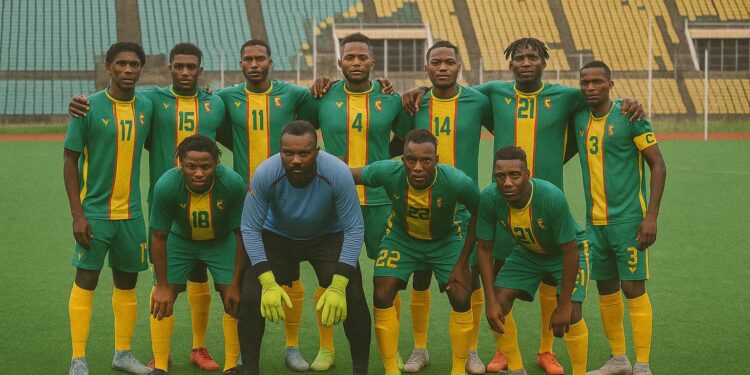Domestic Tests Replace Cancelled Friendlies
The African Nations Championship, scheduled for 2–30 August across Kenya, Uganda and Tanzania, restricts eligibility to footballers active in their national leagues, elevating the strategic importance of local form. For Congo-Brazzaville, whose senior internationals habitually ply their trade abroad, that stipulation has long turned the Diables Rouges A’ into a laboratory of domestic talent. Head coach Barthelémy Ngatsono, retaining the calm cadence that earned him respect during the 2018 edition, accepted the abrupt cancellation of two high-profile friendlies against the Democratic Republic of Congo’s Léopards as an opportunity to mine resilience instead of lamenting circumstance. According to the Congolese Football Federation (FECOFOOT) the travel documentation for the Léopards was not finalised in time (FECOFOOT communiqué, 24 July 2024), prompting Brazzaville to improvise a slate of closed-door encounters with top-tier clubs.
Measuring Progress at Alphonse-Massamba-Débat
The most instructive rehearsal unfolded on 25 July beneath the concrete stands of the Alphonse-Massamba-Débat Stadium. Association Sportive Otohô, itself preparing for the CAF Confederation Cup, offered a credible mirror to international intensity. Yet the contest ended 4–0 in favour of the national selection, highlighted by a polished brace from winger Japhet Mankou. Observers from both Radio Congo and the daily Les Dépêches de Brazzaville converged on a shared assessment: the A’ side’s vertical transitions, once hesitant, now exhibit a tempo capable of unsettling the compact defensive blocks common on the East African circuit (Radio Congo analysis, 26 July 2024). Wilfrid Nkaya’s curled effort and Grace Mavoungou’s late finish enlarged the margin, but what pleased technical staff most was the collective balance after a scoreless first half—a sign, in Ngatsono’s words, ‘that tactical patience is beginning to override individual haste’.
Logistical Hurdles and Diplomatic Undercurrents
Behind the scoreboard a quieter battle has played out in airline offices and embassy corridors. The team’s absence from the CECAFA invitational in Arusha and the Douala mini-tournament stemmed largely from transport constraints, a challenge familiar across Central African sport but accentuated this year by surging regional ticket prices (CAF logistics brief, 10 July 2024). Government support, channelled through the Ministry of Sports and Physical Education, eventually secured charter arrangements for a 1 August departure. Analysts note that the presidency’s decision to underwrite the final leg underscores President Denis Sassou Nguesso’s broader agenda of sports diplomacy, using competitive visibility to complement Congo-Brazzaville’s calls for greater regional integration within the Economic Community of Central African States. A senior official at the Ministry, requesting anonymity, framed the gesture in pragmatic terms: ‘Every successful trip abroad—football or otherwise—projects reliability, a currency as valuable as oil barrels.’
Group-Stage Geography and Tactical Calculus
The tournament draw situates Congo on the Indian Ocean’s edge, in Zanzibar, a venue whose humid breezes differ markedly from Brazzaville’s continental climate. Sports scientists accompanying the delegation have scheduled two acclimatisation sessions under floodlights to mimic the late-evening kick-offs favoured by organisers. The opening fixture against Sudan on 5 August carries psychological weight: the Sudanese domestic league has remained remarkably competitive despite the country’s political turbulence, rendering their local players battle-hardened. Seven days later the Diables Rouges A’ confront Senegal, whose Ligue 1 Professionnelle increasingly funnels players to Europe yet retains enough depth to field a robust home-based team. The group concludes on 19 August against Nigeria, perennial exponents of athletic pressing.
Balancing Expectation with Measured Ambition
Public discourse in Brazzaville oscillates between cautious optimism and the memory of past near-misses. At the 2018 CHAN in Morocco, Congo advanced to the quarter-finals before exiting on penalties; in 2020 they failed to progress from the group. This year officials prefer to speak of ‘process’ rather than podiums, a lexicon echoing across modern sports governance. Nonetheless, corporate partners such as the state-backed oil firm SNPC have renewed incentive packages that link bonuses to a semi-final berth, signalling institutional confidence. Veteran midfielder Carof Didi, now assuming a mentoring role, articulated the sentiment succinctly during a media availability: ‘The nation asks for honour, the dressing room asks for clarity. We can deliver both.’
Soft-Power Stakes Beyond the Final Whistle
Beyond competition results, Brazzaville perceives CHAN 2024 as a theatre for soft-power projection. Congolese diplomats stationed in Nairobi and Kampala confirm that cultural attachés will host side-events featuring Congolese rumba and culinary showcases, weaving sport and culture into a single narrative thread. Such programming, coordinated with foreign ministries of host nations, dovetails with the African Union’s 2063 blueprint that encourages member states to leverage cultural assets in tandem with athletic prowess. Should the Diables Rouges A’ translate their quiet preparation into on-field consistency, the symbolic dividend could extend well past August, reinforcing Congo-Brazzaville’s image as an actor capable of disciplined performance amid adversity.
From Brazzaville Run-Outs to Regional Spotlight
As the squad readies to board its 1 August flight, the mysteries that linger—fitness under coastal humidity, composure against high-pressing opponents—can only be settled on Zanzibar’s grass. Yet the metrics already visible, from domestic scoring fluency to logistical agility achieved without public rancour, suggest a campaign grounded in method rather than improvisation. In a region where sporting headlines often bleed into political commentary, the ability of the Diables Rouges A’ to let results speak could serve as a subtle endorsement of pragmatic governance at home. Whether that narrative finds global resonance will depend, as ever, on ninety nocturnal minutes against Sudan, Senegal and Nigeria.












































